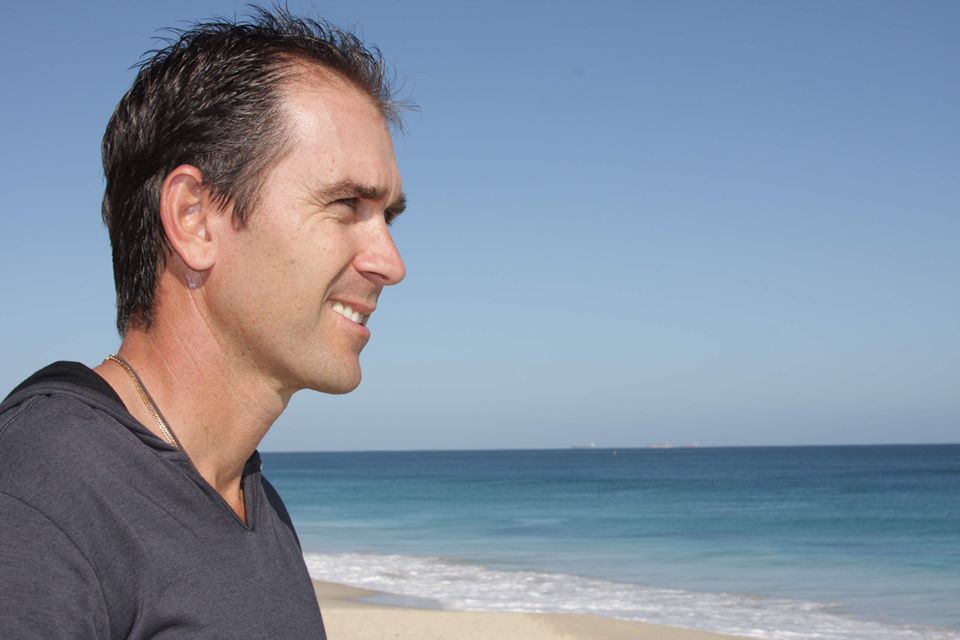Live your Passion: Justin Langer
Our project, our theory is this. You find your passion as a kid and you tend to forget it, as you get older. We have found that we are living our passion today, right now. We have since realised we were doing what we loved or passion when we were eight years old, but in a different form. And if you didn’t lose that passion, our lives would be better. Justin Langer has lived his passion or the dream all his life.

Justin Langer
Played 105 Test matches
Total test runs scored 7696
Test batting average 45.3
Highest Test score 250 runs
We met Justin Langer several years ago at one of his favourite haunts, Floreat Beach, Perth, Western Australia. Justin said that “when home we come here nearly every morning, how lucky are we. In the summer we have a swim, there isn’t a soul on the beach.” We chatted with this highly respected Australian sports star about Passion and the concept of Living the Dream.
“That a big thing because I do these seminars and I do my speaking and one of the modules is about living the dream and sadly not many people do it. I did it for twenty years and when you step out of that life, I am now looking at my next avenue to live my dream. My dream is to be with my family, be at home and I am actually craving being at home. So I am trying to look for all the sources of income that I can get while being at home. My passion isn’t travelling any more. My passion is to be at home with my family. The problem with my job, my income opportunities are interstate or overseas. And do you know what, I don’t want to do it anymore. I want to live my dream, and encouraging people to live their dream and if I am not doing it myself. It is the problem with a lot of motivational speakers. There is no point speakers telling you what to do unless they do it themselves or they have lived it. The best sports psychologists or the best coaches are because they have experienced it, they don’t just think it they feel it, it oozes out of them. It’s not academic, it’s real. That’s the thing about living the dream.
As a kid all I wanted to do was play cricket and then what happened, then it got to high school years. People started asking what are you going to do with your life?
“I really want to pay cricket”
“Yeh but what are you going to do with your life?’
The best advice I ever had: I went to Uni, I wanted to be a physiotherapist or I thought I did because it was related to sport and I just missed out on the marks at school. I started an arts degree, don’t ask me why, but I like writing and in my first year I did economics, psychology and human movement so I wasn’t even writing. I did do English, so there was a little bit of writing then. A guy by the name of Ian Cavenah, my next-door neighbour for 15 years, said, “what are you doing at Uni? What do you want to do with your life?
“I really want to play cricket”
“Well you know what son, you should follow your heart, follow your gut, follow your heart. Go and play cricket. ‘
Ninety per cent of people say get security, get the degree, get the apprenticeship, then go and do what you love.
But Ian said to me GO FOR IT, go with all your heart and so I went to England for the first time when I was 18 and guess what, I was living my dream.
When I was eleven years old, I used to play cricket, backyard cricket all the time. I used to live in Duncraig [Perth suburb]. I went out to my old primary school and spoke to students. I drove past my old house and I thought the front yard and the back yard was the size of the MCG because I always built it up in my mind. But looking at it now, it was tiny. In the front driveway we played cricket with all the neighbours. Out in the backyard we would play on the grass with backyard test matches. Cricket Cricket Cricket. I remember when I was eleven, it was Boxing Day 1981, Kim Hughes got a hundred against the West Indies. Kim Hughes was my childhood hero. On the last ball of the day, Dennis Lillee, great long hair, big hairy chest, big gold chain, shirt down to his bellybutton, runs in and bowls the great Viv Richards on the last ball of the day. So at eleven years old, not only had Kim Hughes get a hundred and Dennis Lillee bowled and the crowd went wild. I still remember that image as a little kid.
Then what happened when I was sixteen, the last year of high school, I went to England for the first time with a schoolboy’s team. That is when I decided I wanted to play professional cricket. I was the youngster and everyone was a bit older than me, they had already left school, except me. We played cricket everyday and they taught me how to drink. It was a wild trip but every day we played cricket. And I thought how good is this. Imagine if I could do this every day and make a living.
Then a couple things happened:
I played a game at Lords on the nursery ground and I got a hundred at sixteen. I remember running to the big red phone box and reverse charging to my mum and dad saying I got a hundred at Lords and they were pumped. I remember that feeling of ringing them at 3 o’clock in the morning, I had to ring them. They were so excited. And then a few days later, a guy named Peter Wright offered me a bat contract. He gave me two cricket bats at 16. Someone must have said there is this young Aussie kid, he’s not bad so he gave me the cricket bats. Then I became a bit of a hero because kids were saying you must be good because I got free gear. That was it, I thought, How good is this.
Then I kept jumping into hurdles. People kept saying I had to get a degree, go to uni, “Yeh but I want to play cricket.” Yeh but you have to get a real job’ There were all those stepping-stones along the way.
I played my first A grade game at 15 years old for Scarborough and Dennis Lillee was my team mate. On the opposition was Kim Hughes and I was playing against him and also Terry Aldermann and Tom Hogan. All these guys and I was playing against them at fifteen, all these heroes.
I was 21 when I joined the Western Australian State Shield Cricket Team. Today international players are on the road for ten months of the year so they very rarely play club cricket, which is one of the problems but that is life. Even the shield players, the Warriors, don’t play a lot of club cricket because they are on the road a lot. Unlike me, a lot of the youngsters don’t get to play with their heroes anymore.
We (Australia) boasts about having the best club cricket system in the world but now its been watered down because the best players don’t get to play. The internationals don’t play, shield players play a lot less and a lot of the youngsters don’t get the same experience as I had. I was playing with Dennis Lillee and Terry Aldermann who had just won the Ashes for Australia. I was rubbing shoulders with my heroes and they gave me some amazing advice along the way. Kids don’t learn from kids. Kids learn from men and women.
I used to go to the footy (WAFL) with my dad, and people would swear and carry on. The full forward for Perth was shooting for a goal and yelled out ‘miss it mongrel’ because that is what everyone else was saying. Well oh my god that was the most trouble I have ever been in because it was being disrespectful. Dad taught me that. “Don’t talk like that.” And I always remember that from being eleven years old. RESPECT.
When I started martial arts, my instructor, my sensei was John, the toughest man in the world. I was two or three weeks into practicing. I walked onto the Dojo floor, next thing I know, bang. I was wacked in the back of the head. I was lying on the mat and I looked up and said “Sensei, what did I do wrong?”
He said “don’t you ever show me that disrespect again.”
“What do you mean?”
“On the Dojo floor you always walk behind the sensei”
I was sixteen and these days, you might get sued for doing that, but that was one of the greatest lessons I have ever learnt about respect. And I will never forget it.
I am frequently asked the question ‘What is the highlight of your career?’ The highlight of my career was winning sixteen straight test matches. We broke the world record and that was a team thing because in that time, if you are winning you are happy and you learn about winning, and winning becomes a habit, and learning those habits is very powerful. It’s the same as losing. If you keep learning how to lose, guess what, you get a losing habit. I would never have broken Bradman’s record if I didn’t have the partnerships and mentors along the way. It’s all about surrounding yourself with good people.
Another highlight was singing the song at the end of a test match. Getting in there with my mates and our baggy green caps on. We listen to John Williamson’s True Blue, then Cold Chisels Khe San and I was lucky enough to be the team song-master, which is a great honour in Australia playing cricket. I would get up there on the table, my mates would get arm in arm. We have had a few beers by then and we just celebrate our success. Then we sing the team song. My greatest memories aren’t about making a hundred, it’s about singing the song with my mates. To me that’s what it is all about.
That is one of the brilliant things about team sport. It is the same in businesses. If you develop the team culture where people love coming to work, you have got to be more fruitful. Same if you create team culture, and people love playing for their mates, you have to be more fruitful and successful. It is as simple as that?
For me, being fit is just part of my life. It isn’t a chore. There is no point telling my kids to be fit if I’m not. If you preach excellence but live mediocrity, you are nothing but a common liar.
I love writing. I won the English prize for Year 12 at Aquinas. Now I have written a book that is due out in August [at the time of the interview]. I also do a lot of speaking. Last night I did a speaking gig for a crowd that was Australian and Indian. I had prepared the speech for a few days. From the time I got there at 7pm to my time to speak at 9pm, my whole speech had changed. The crowd was mainly of people with Indian heritage so because I have so many stories, I could change it all around. People ask me how I remember so many stories. I’m pretty sure it comes from writing all my stories down because I like writing so I can pull out stories easily.
I’ve learnt two lessons about speaking in public:
I went to see three speakers. One was Wayne Swan, the treasurer, he read his speech and tippy toed around the questions. I saw Andrew Forrest speak a few days before. He was very good at a breakfast. He spoke for an hour with passion. Then I saw Belfont, the Wolf of Wall Street, he was brilliant. He spoke for two hours telling stories. It’s all about stories.
I went to a level 3 coaching course in Brisbane and then I did a conference Science Medicine Coaching Course on the Gold Coast. I sat through four days last week and five days this week. All were PowerPoint presentations. I thought my brain was going to burst. My great strength is concentration and I’m struggling to stay with what they are saying. They were talking about illicit learning where you go out and do the learning. But the whole five days was explicit learning where they were just lecturing us and I didn’t learn one thing. It is all about stories because that is where I have become successful at speaking. You use the story to get the message out there. People will remember the story and the message.
These days, Justin Langer is currently the coach of the Australian men’s cricket team. It’s a job in which Australians hold in very high esteem. The irony is that Justine Langer has put his dream of a quiet family life on hold, as the coaching job involves lots of travel. I should add here, right now, COVID 19 has put a temporary halt on that
For more time with Justin watch Barry Cassidy’s One plus One

